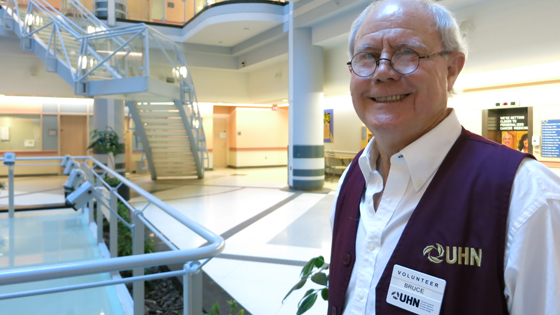
As a cancer survivor, Bruce Campbell was inspired to help patients manage the emotional burden of cancer. He spends two days each week as a volunteer at Princess Margaret Cancer Centre. (Photo: UHN)
You have cancer.
As a prostate cancer survivor, Bruce Campbell understands the emotional burden tied to these three life-changing words.
Has it spread? What are my treatment options?
Will I survive?
Research shows that distress in cancer patients is highly prevalent and associated with negative health outcomes – yet remains poorly detected and inadequately managed.
This is why Bruce dedicates two days per week as a volunteer helping patients at the Princess Margaret Cancer Centre fill out the
Distress Assessment and Response Tool (DART), a short, self-assessment measuring a patient's physical symptoms, psychosocial needs and practical concerns throughout their cancer journey.
'Focus on the person, not the tumour'
No two people living with cancer are alike.
Some have just been diagnosed or are going through treatment, while others no longer have cancer or are thought to be cured. Some continue to be actively supported through palliative care.
The
Department of Psychosocial Oncology and Palliative Care (POPC) at the Princess Margaret is dedicated to providing support through all stages of the cancer experience. The goal is to support patients and their families in managing the complexities of having cancer, including physical and emotional symptoms such as depression and anxiety.
"DART is the ultimate personalized cancer medicine tool and example of person-centered care," says Dr. Madeline Li, developer of DART and Staff Psychiatrist at the Princess Margaret.
'We want to focus on the person, not the tumour."
Odette Young, Patient Flow Coordinator at the Princess Margaret and Bruce Campbell, volunteer, help patients fill out DART assessments before every clinic visit. (Photo: UHN)
Breaking down communication barriers
All cancer patients that have a clinic visit at the Princess Margaret complete DART screening on an iPad or computer before their appointment begins. Personalized reports are created in real time and are reviewed by health care professionals in clinic.
Screening patients routinely while they have cancer and at every clinic appointment, allows health care providers to monitor progress and identify whether patients may require further emotional and psychosocial support in clinic or from other professionals.
"Cancer is distressing to patients and their family members. DART offers patient's a voice – one that drives care planning in the moment, and future program development. DART positions the patients as partners in care," says Alyssa Macedo, Program Lead, DART.
Patients may be distressed about topics they're embarrassed about or afraid to discuss, such as financial issues, sexual symptoms, depression and fear of dying.
"If we screen for symptoms and start talking early enough, we can provide patients with the right care, at the right time, by the right professional," says Alyssa.
"Some patients may need to be linked with specialty services; palliative nurses or psychosocial support to alleviate both physical and emotional issues – ultimately, we want to offer better quality of life to patients entering the end stages of their lives."
Without a standardized assessment in place, health care providers can miss up to 70 per cent of distressed patients. This is why
Cancer Care Ontario mandated a 70 per cent symptom screening response rate in 2009. The Princess Margaret has exceeded this rate with an average rate of 75 per cent since 2012. It's estimated that about 10,000 DART assessments are completed every month.
From a clinician perspective, Dr. Li explains that there needs to be a shift in the way we deliver care to cancer patients.
"DART makes it more comfortable for healthcare providers to offer support related to emotional well-being to their patients. This is relevant during difficult conversations around early palliative care and counselling."
The goal is for clinicians and healthcare providers to use DART as a patient care planning tool that is flexible enough to meet the individual needs of each patient coming through the cancer centre.
Continuing the conversation
Since 2012, Bruce has worked as a volunteer and DART champion serving patients in eight different clinics across the Cancer Centre. He serves on two committees as a patient advocate including the DART internal working group and DART operations committee.
He offers feedback on the types of questions patients should be asked in the short assessment and how response rates could be improved in the clinics. Bruce advocates for the patients and helps ensure DART is a seamless process in clinic.
"Every patient needs a champion and typically it's the caregiver," says Bruce. "But you'd be surprised at how many individuals are going through the cancer experience alone.
"That's why DART is so important. It solicits responses to a range of important questions that patients might not think to bring up to their doctor.
"When I volunteer, I see myself as a patient advocate and facilitator of this process."
